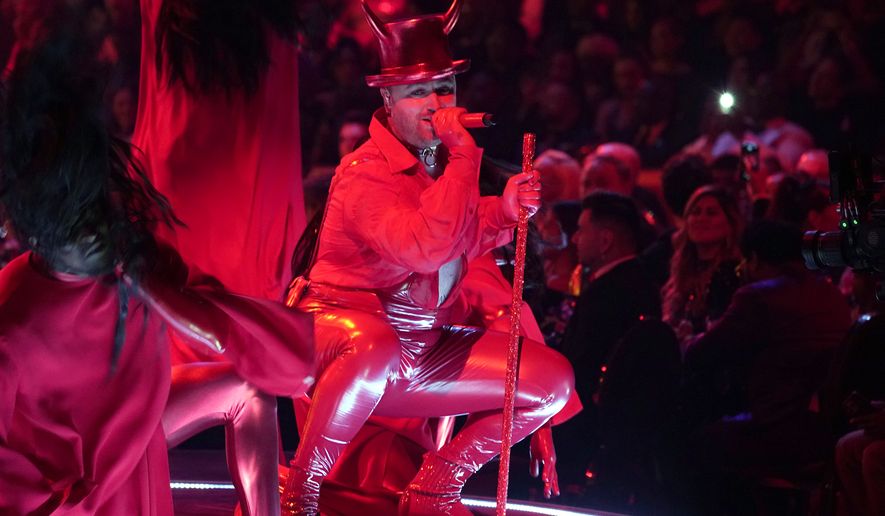OPINION:
For anyone still pondering the intensity of rot ravenously devouring our collective moral core, Sunday night’s Grammy Awards clarified the current state of affairs: we’ve crossed the line, hopped a few curbs, and we’re all drowning in an disreputable quicksand of our own making.
Singers Sam Smith and Kim Petras’ “Unholy” performance immediately went viral, offering a disturbing display of demonic elements and imagery.
But while the devil horns and she-demons proudly prancing around the stage set off a firestorm of indignant and angry furor, the bizarre and clownish affair immediately left me with a very different emotion: lament.
As I watched as much of the performance as I could bear, I felt a sadness and despair not only for the two singers but for the lemming-like cacophony of support coming from pockets of people who felt it pertinent to glowingly praise and herald a performance that encapsulated everything wrong with American culture today.
The whispers of Hollywood’s embrace of evil have always reverberated in the shadows, but, in recent years, there’s been a shift in tone — one in which satanic themes are suddenly being spotlighted in newfound and curious ways.
Gone are the days of the devil lurking undetected and disguising himself as an angel of light. Now, he’s being given a full-court press, with celebrities perpetuating occultic imagery and the public gobbling it up like esurient seals awaiting a vat of fish.
Whether it’s Lil Nas X’s absurd music video featuring him slipping down a pole into hell before giving Satan a lap dance or this latest infusion of evil, there are a few key takeaways any reasonable person uncompromised by cultural corrosion should be able to glean.
First, rather than meeting the ludicrousness with rage-filled rants, we should be filled with a somberness, grimness and sorrow that leads us to utter prayerful appeals for those so willing to give the devil such a prevalent platform.
Evil is real and making light of it or entertaining it is a sign of spiritual unhealth. Furthermore, the decision to blast it out to the public magnifies the percolating crisis.
It’s certainly easy to lash out on social media, lambasting performers and their supporters, but Christians are called to something different: prayer and love for others. Rather than endlessly castigating, our time would be better spent asking God to change hearts and minds.
Beyond that reality, there’s another issue we must address — and it underpins the argument against rage and anger when we encounter such performances. While we should feel empowered to boldly and lovingly call out the insanity and dismantle the evil themes within, we can’t ignore the slothy manner through which these spectacles come to fruition.
Using Satan and evil to sell a song, product or performance might be “art” as some critics argue, but it’s truly the laziest, most sub-par form of expression available to man.
True talent doesn’t need to latch itself to wickedness or intentionally rile the masses by trashing the faithful or elevating evil; real aptitude and flair captivates, speaks pertinent or oft-times unenviable truths, and, when at its best, edifies.
The two singers accomplished none of this in their performance, with the acts and antics preceding them in recent years offering similarly vapid audience experiences. It’s easy to sell sex and controversy, and that shouldn’t be lost on any of us.
But it’s almost embarrassing for people blessed with stunning voices and talents to play to the lowest common denominator — so seemingly mortifying for them, in fact, that justifying their lazy tactics with anger seems unhelpful and, quite frankly, a waste of time and energy.
But, finally, while we should turn to prayer and patently decline to waste our rage on these thirsty attempts at attention, we must also do something else: remember the very real nature of evil in our world.
The Prophet Isaiah, writing between 739 and 681 B.C., offered a timeless warning our nation must heed today: “Woe to those who call evil good and good evil, who put darkness for light and light for darkness, who put bitter for sweet and sweet for bitter.” (Isaiah 5:20)
We’re dominated by a world under such a prevalent secular spell that many are elevating darkness in an effort to snuff out the light.
Evil is real and such attempts to merge its symbolism with entertainment leave the door open for some to further lionize its presence in our culture. Treating evil like a parlor trick or an entertainment ploy cheapens it, diminishes it and leaves us in an even more tattered state.
So, let’s all take the time to also invoke God on behalf of our country. After all, we live in a culture that so desperately needs him.
• Billy Hallowell is a digital TV host and interviewer for Faithwire and CBN News and the co-host of CBN’s “Quick Start Podcast.” Hallowell is the author of four books, including “Playing with Fire: A Modern Investigation into Demons, Exorcism, and Ghosts,” and “The Armageddon Code: One Journalist’s Quest for End-Times Answers.”




Please read our comment policy before commenting.